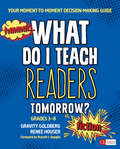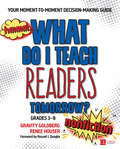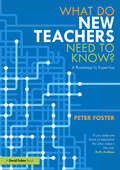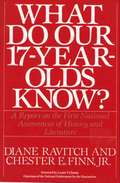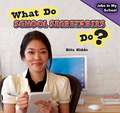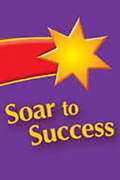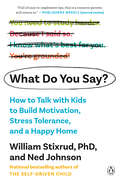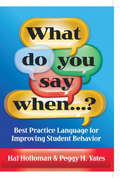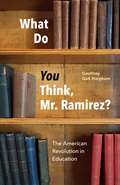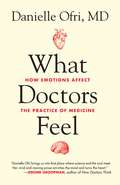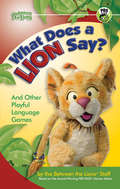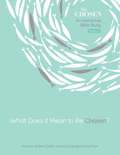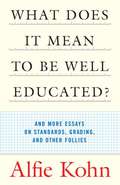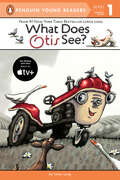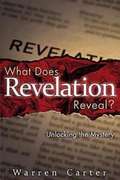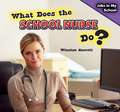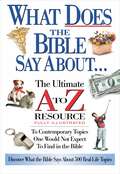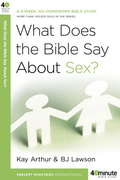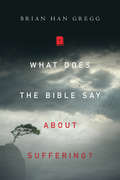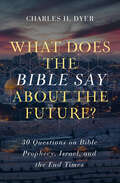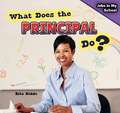- Table View
- List View
What Do I Teach Readers Tomorrow? Fiction, Grades 3-8: Your Moment-to-Moment Decision-Making Guide (Corwin Literacy)
by Gravity Goldberg Renee W. HouserStreamline formative assessment for readers in just minutes a day With What Do I Teach Readers Tomorrow? Fiction, discover how to move your readers forward with in-class, actionable formative assessment. The authors provide a proven, 4-step process—lean in, listen to what readers say, look at what they write, and assess where they need to go next. Next-step resources for whole-class, small-group, and one-on-one instruction, include Reproducible Clipboard Notes pages for quick assessments More than 30 lessons to get you started Reading notebook entries and sample classroom conversations Online video clips of Renee and Gravity teaching and debriefing
What Do I Teach Readers Tomorrow? Nonfiction, Grades 3-8: Your Moment-to-Moment Decision-Making Guide (Corwin Literacy)
by Gravity Goldberg Renee W. HouserStreamline formative assessment for readers in just minutes a day With What Do I Teach Readers Tomorrow? Nonfiction, discover how to move your readers forward with in-class, actionable formative assessment. The authors provide a proven, 4-step process—lean in, listen to what readers say, look at what they write, and assess where they need to go next. Next-step resources for whole-class, small-group, and one-on-one instruction, include Reproducible Clipboard Notes pages for quick assessments More than 30 lessons to get you started Reading notebook entries and sample classroom conversations Online video clips of Renee and Gravity teaching and debriefing
What Do I Teach Readers Tomorrow? Nonfiction, Grades 3-8: Your Moment-to-Moment Decision-Making Guide (Corwin Literacy)
by Gravity Goldberg Renee W. HouserStreamline formative assessment for readers in just minutes a day With What Do I Teach Readers Tomorrow? Nonfiction, discover how to move your readers forward with in-class, actionable formative assessment. The authors provide a proven, 4-step process—lean in, listen to what readers say, look at what they write, and assess where they need to go next. Next-step resources for whole-class, small-group, and one-on-one instruction, include Reproducible Clipboard Notes pages for quick assessments More than 30 lessons to get you started Reading notebook entries and sample classroom conversations Online video clips of Renee and Gravity teaching and debriefing
What Do Living Things Need? (Science Readers #Guided Reading Level B)
by Elizabeth AustenWhat do living things need to survive? Find out in this colorful science reader! Discover that living things need light, food, water, air, space, homes, protection, and more! The easy-to-read text and vibrant images will keep young readers engaged from start to finish. This reader also includes a fun science activity and practice problems to give students additional practice in sorting living and not living things. A helpful glossary and index are also included for support.
What Do New Teachers Need to Know?: A Roadmap to Expertise
by Peter FosterWhat knowledge will make you most effective as a teacher? New teachers are often bombarded with information about the concepts they should understand and the topics they should master. This indispensable book will help you navigate the research on curriculum, cognitive science, student data and more, providing clarity and key takeaways for those looking to grow their teaching expertise. What Do New Teachers Need to Know? explores the fundamentals of teacher expertise and draws upon contemporary research to offer the knowledge that will be most useful, the methods to retain that knowledge, and the ways expert teachers use it to solve problems. Written by an educator with extensive experience and understanding, each chapter answers a key question about teacher knowledge, including: • Does anyone agree on what makes great teaching? • How should I use evidence in my planning? • Why isn’t subject knowledge enough? • What should I know about my students? • How do experts make and break habits? • How can teachers think creatively whilst automating good habits? • What do we need to know about the curriculum? • How should Cognitive Load Theory affect our pedagogical decisions? Packed with case studies and interviews with new and training teachers alongside key takeaways for the classroom, this book is essential reading for early career teachers, those undertaking initial teacher training and current teachers looking to develop their expertise.
What Do Our 17-Year-Olds Know
by Diane RavitchWhat Do Our 17-Year-Olds Know? Gives the results of the first nationwide test of American high school students' knowledge of history and literature, as well as fascinating insight into what teenagers are reading, how much television they watch, what influence their home environment has on their academic achievement, and what historical topics and literary works are included in (or have been dropped from) the school curriculum.
What Do School Secretaries Do? (Jobs in My School Ser.)
by Rita KiddeSchool secretaries are organized, friendly, and dedicated, but many young students don't give them much thought. By reading more about school secretaries, students will come to better understand and appreciate the many ways these individuals ensure that their schools run smoothly.
What Do You Do When Something Wants To Eat You?: Soar To Success Student Book Level 3 Wk 8
by Steve JenkinsA hungry wolf's attempts to fatten a chicken for his stewpot have unexpected results. NIMAC-sourced textbook
What Do You Say?: How to Talk with Kids to Build Motivation, Stress Tolerance, and a Happy Home
by William Stixrud Ned JohnsonA guide to effectively communicating with teenagers by the bestselling authors of The Self-Driven ChildIf you're a parent, you've had a moment--maybe many of them--when you've thought, "How did that conversation go so badly?" At some point after the sixth grade, the same kid who asked "why" non-stop at age four suddenly stops talking to you. And the conversations that you wish you could have--ones fueled by your desire to see your kid not just safe and healthy, but passionately engaged--suddenly feel nearly impossible to execute. The good news is that effective communication can be cultivated, learned, and taught. And as you get better at this, so will your kids.William Stixrud, Ph.D., and Ned Johnson have 60 years combined experience talking to kids one-on-one, and the most common question they get when out speaking to parents and educators is: What do you say? While many adults understand the importance and power of the philosophies behind the books that dominate the parenting bestseller list, parents are often left wondering how to put those concepts into action. In What Do You Say?, Johnson and Stixrud show how to engage in respectful and effective dialogue, beginning with defining and demonstrating the basic principles of listening and speaking. Then they show new ways to handle specific, thorny topics of the sort that usually end in parent/kid standoffs: delivering constructive feedback to kids; discussing boundaries around technology; explaining sleep and their brains; the anxiety of current events; and family problem-solving. What Do You Say? is a manual and map that will immediately transform parents' ability to navigate complex terrain and train their minds and hearts to communicate ever more successfully.
What Do You Say When...?: Best Practice Language for Improving Student Behavior
by Hal Holloman Peggy YatesDo you remember a time when you used the right words at the right moment, and they made all the difference? With the aim of helping you repeat that experience every day, this book provides hundreds of examples of what we call “Best Practice Language” (BPL), a research-based technique designed to help teachers use words to improve student behavior – in the classroom and beyond. In their years of working at the K-12 levels, educators Hal Holloman and Peggy H. Yates have identified the exact phrases and key words you can use to handle: recurring disruptions, inappropriate outbursts, and students’ low self-confidence, among other classroom realities. BPL will enable you to: Set your expectations clearly on the first day of school Prevent and resolve conflicts between students Create a safe haven for shy, apprehensive students Establish meaningful relationships with students built on trust Help students foster a respect for themselves, their peers, and for adults Maintain a positive classroom environment that encourages personal responsibility Whether you're a new teacher, a veteran teacher, a pre-service teacher, or school administrator, the tools in this book will help you use words effectively, in ways that resonate with students and provide them with clear and promising direction.
What Do You Think, Mr. Ramirez?: The American Revolution in Education
by Geoffrey Galt HarphamGeoffrey Galt Harpham’s book takes its title from a telling anecdote. A few years ago Harpham met a Cuban immigrant on a college campus, who told of arriving, penniless and undocumented, in the 1960s and eventually earning a GED and making his way to a community college. In a literature course one day, the professor asked him, “Mr. Ramirez, what do you think?” The question, said Ramirez, changed his life because “it was the first time anyone had asked me that.” Realizing that his opinion had value set him on a course that led to his becoming a distinguished professor. That, says Harpham, was the midcentury promise of American education, the deep current of commitment and aspiration that undergirded the educational system that was built in the postwar years, and is under extended assault today. The United States was founded, he argues, on the idea that interpreting its foundational documents was the highest calling of opinion, and for a brief moment at midcentury, the country turned to English teachers as the people best positioned to train students to thrive as interpreters—which is to say as citizens of a democracy. Tracing the roots of that belief in the humanities through American history, Harpham builds a strong case that, even in very different contemporary circumstances, the emphasis on social and cultural knowledge that animated the midcentury university is a resource that we can, and should, draw on today.
What Doctors Feel
by Danielle OfriA look at the emotional side of medicine--the shame, fear, anger, anxiety, empathy, and even love that affect patient care Physicians are assumed to be objective, rational beings, easily able to detach as they guide patients and families through some of life's most challenging moments. But doctors' emotional responses to the life-and-death dramas of everyday practice have a profound impact on medical care. And while much has been written about the minds and methods of the medical professionals who save our lives, precious little has been said about their emotions. In What Doctors Feel, Dr. Danielle Ofri has taken on the task of dissecting the hidden emotional responses of doctors, and how these directly influence patients. How do the stresses of medical life--from paperwork to grueling hours to lawsuits to facing death--affect the medical care that doctors can offer their patients? Digging deep into the lives of doctors, Ofri examines the daunting range of emotions--shame, anger, empathy, frustration, hope, pride, occasionally despair, and sometimes even love--that permeate the contemporary doctor-patient connection. Drawing on scientific studies, including some surprising research, Dr. Danielle Ofri offers up an unflinching look at the impact of emotions on health care. With her renowned eye for dramatic detail, Dr. Ofri takes us into the swirling heart of patient care, telling stories of caregivers caught up and occasionally torn down by the whirlwind life of doctoring. She admits to the humiliation of an error that nearly killed one of her patients and her forever fear of making another. She mourns when a beloved patient is denied a heart transplant. She tells the riveting stories of an intern traumatized when she is forced to let a newborn die in her arms, and of a doctor whose daily glass of wine to handle the frustrations of the ER escalates into a destructive addiction. But doctors don't only feel fear, grief, and frustration. Ofri also reveals that doctors tell bad jokes about "toxic sock syndrome," cope through gallows humor, find hope in impossible situations, and surrender to ecstatic happiness when they triumph over illness. The stories here reveal the undeniable truth that emotions have a distinct effect on how doctors care for their patients. For both clinicians and patients, understanding what doctors feel can make all the difference in giving and getting the best medical care. Praise for Danielle Ofri "The world of patient and doctor exists in a special sacred space. Danielle Ofri brings us into that place where science and the soul meet. Her vivid and moving prose enriches the mind and turns the heart." --Jerome Groopman, author of How Doctors Think "Danielle Ofri is a finely gifted writer, a born storyteller as well as a born physician." --Oliver Sacks, author of Awakenings "Danielle Ofri ... is dogged, perceptive, unafraid, and willing to probe her own motives, as well as those of others. This is what it takes for a good physician to arrive at the truth, and these same qualities make her an essayist of the first order." --Abraham Verghese, author of Cutting for Stone "Danielle Ofri has so much to say about the remarkable intimacies between doctor and patient, about the bonds and the barriers, and above all about how doctors come to understand their powers and their limitations." --Perri Klass, MD, author of A Not Entirely Benign Procedure "Her writing tumbles forth with color and emotion. She demonstrates an ear for dialogue, a humility about the limits of her medical training, and an extraordinary capacity to be touched by human suffering." --Jan Gardner, Boston Globe From the Hardcover edition.
What Does a Lion Say?: And Other Playful Language Games
by Between the Lions StaffFoster a love of reading with your friends from Between the Lions®!Children and parents love Between the Lions, an award-winning public television series that celebrates the joy of reading and offers a playful approach to introducing key literacy skills.What Does a Lion Say? builds on the appeal and literacy focus of Between the Lions.With on-the-go games that are perfect for busy lifestyles, this book is filled with fun and easy literacy games for you to play with your children anytime, anywhere. Children will love learning along with their favorite characters, whether in the car or at the doctor's office, at home, or on a trip. These games introduce the world of letters and reading, while building skills all children need for a lifetime of learning.With alphabet games like "License Plate Lingo," writing games like "Au-Toe-Graph," and describing games like "Silly Scenarios," What Does a Lion Say? helps you make the most of playful, everyday moments with your child.
What Does It Mean to Be Chosen?: An Interactive Bible Study (The Chosen Bible Study Series #1)
by Amanda Jenkins Dallas Jenkins Dr. Douglas HuffmanThis is the official companion study to season 1 of The Chosen, the groundbreaking television series about the life of Jesus. What Does It Mean to Be Chosen? parallels each episode, connecting readers to the Bible in a brand-new way. It includes: A deeper look at Isaiah 43 and its fulfillment in Jesus and the lives of His followers (including us!)Script excerpts, quotes, and illustrations from the showGuiding questions for groups or individuals Being chosen by Jesus has beautiful and far-reaching implications—although it says even more about the Chooser than the choosees. We are loved because He&’s love. We are saved because He&’s merciful. We belong to the family of God because Jesus invites us, making the Bible and all its promises as true for us today as it was for God&’s chosen nation. What does it actually mean to be Chosen? To answer that question, we&’re going Old school—Testament that is—which leads us back to the New. Which always leads us directly to Jesus.
What Does It Mean to Be Well Educated?
by Alfie KohnKohn takes on the recent trend to stress grades and standardized testing in American schools. He compares getting an education to getting through the system, and finds that frustration and lack of real achievement grow in parallel when students are schooled rather than educated. The results, he believes, include a population more likely to be violent and less likely to think reasonably through issues and situations. Annotation ©2004 Book News, Inc. , Portland, OR (booknews. com)
What Does Otis See? (Otis)
by Loren LongWatch Get Rolling with Otis on Apple TV!Featuring the New York Times bestselling character Otis! Join Otis as he explores the many fun things there are to see on the farm! In this new leveled reader, Otis sees a puppy, a little calf, and even a bull. Kids will love learning to read with one of their favorite characters, Otis the tractor!
What Does Revelation Reveal?: Unlocking the Mystery
by Warren CarterThe Book of Revelation has been mysterious, confusing, and misunderstood for centuries. Its content has been studied and analyzed by scholars from every corner of the globe. What is it about Revelation that draws us to it? Is this biblical book about end-time mysteries and hidden codes? Does and it relate to our present day? So what does Revelation actually reveal? Or should Revelation be left behind? According to Dr. Carter, the book of Revelation can tell us about biblical times as well as our own. It can show us how we, as Christians, are to live and hope for our world. Revelation reveals God's Word to God's World: that culture accommodation is dangerous, that judgment is taking place now, that the world does have a chance to repent, that there are evil powers working behind the scene, that the time is up for the eternal empire, and that God is coming in triumph.
What Does The School Nurse Do? (Jobs in My School Ser.)
by Winston GarrettFrom treating stomachaches to cuts or even worse, the school nurse makes sure students remain well, safe, and happy. Early readers will take a closer look at this vital job, and, in doing so, overcome any anxiety that may have when visiting the school nurse.
What Does the Bible Say About...: The Ultimate A To Z Resource (A to Z Series)
by Thomas NelsonHave you ever wondered: what does the Bible have to say about___? Now you fill in the blank. This Ultimate A to Z Resource applies biblical insight to hundreds of contemporary topics ranging from:AddictionPolitical infightingWorld hungerBirth controlFreewillDysfunctional familiesPrejudiceand Natural disastersIn this handy, portable index, you can easily locate any topic—from the broad (conflict resolution, anxiety, and companionship), to the very specific (contracts, debt, and pornography). Each entry contains a summary of the topic, theological/biblical considerations, and verse references to point you directly to the larger scriptural context.The Bible may be 2,000 years old, but it has relevant and wise words on just about any subject, ancient or modern—it is the Living Word of God, and this quick guide is one great way to familiarize yourself with its contents...one topic at a time.Also contains illustrations from Christian cartoonist Jonny Hawkins.
What Does the Bible Say About Sex? (40-Minute Bible Studies)
by Kay Arthur B. J. Lawson David LawsonDoes God really care about your sex life? In a culture saturated with sex, many find it hard to believe the Creator of the universe cares about this facet of their lives. Others are confused about where to draw the line to avoid going "too far." Married or single, you need to know what God says about sex. After all, He's the one who designed this priceless gift and set clear boundaries to protect it. This candid study will help you weigh the messages of our culture against the truth of God's Word. As you learn about the Designer's original intent for sex, you'll gain valuable insights to guide your daily choices.
What Does the Bible Say About Suffering?
by Brian Han GreggWhat Does the Bible Say About Suffering?
What Does the Bible Say about the Future?: 30 Questions on Bible Prophecy, Israel, and the End Times
by Charles H. DyerAnyone can make predictions about the future. The real question is, &“What does God have to say about it?&”The end times is one of those areas of theology where people have many wild opinions. Don&’t get caught up in all the internet speculations and doomsday prognostications. The real place to find out about the future is the Word of God.In What Does the Bible Say About the Future?, radio host and prophecy expert Dr. Charlie Dyer offers you an insightful look at the end times that&’s grounded not in human fantasies but in the very revelation of God. The Bible actually does have a lot to say about the future. It&’s an important topic for you to study. So instead of taking your cues from the self-appointed prophets of today, let Dr. Dyer take you right back to Scripture. You&’ll get answers to questions like:Are we in the last days right now?Are pandemics like Covid-19 a fulfillment of Bible prophecy?What is the Battle of Armageddon?What is the next event on God&’s prophetic calendar?Where is the United States in Bible prophecy?And most importantly . . . If prophecy is true, what difference should it make in my life?God didn&’t give us Bible prophecy to tickle our imagination or satisfy our intellectual curiosity. Rather, God wants us to know about the end times so we can be confident in His eternal purposes. With a biblical understanding of the future, you&’ll be powerfully equipped to live with faith and hope today!
What Does the Bible Say about the Future?: 30 Questions on Bible Prophecy, Israel, and the End Times
by Charles H. DyerAnyone can make predictions about the future. The real question is, &“What does God have to say about it?&”The end times is one of those areas of theology where people have many wild opinions. Don&’t get caught up in all the internet speculations and doomsday prognostications. The real place to find out about the future is the Word of God.In What Does the Bible Say About the Future?, radio host and prophecy expert Dr. Charlie Dyer offers you an insightful look at the end times that&’s grounded not in human fantasies but in the very revelation of God. The Bible actually does have a lot to say about the future. It&’s an important topic for you to study. So instead of taking your cues from the self-appointed prophets of today, let Dr. Dyer take you right back to Scripture. You&’ll get answers to questions like:Are we in the last days right now?Are pandemics like Covid-19 a fulfillment of Bible prophecy?What is the Battle of Armageddon?What is the next event on God&’s prophetic calendar?Where is the United States in Bible prophecy?And most importantly . . . If prophecy is true, what difference should it make in my life?God didn&’t give us Bible prophecy to tickle our imagination or satisfy our intellectual curiosity. Rather, God wants us to know about the end times so we can be confident in His eternal purposes. With a biblical understanding of the future, you&’ll be powerfully equipped to live with faith and hope today!
What Does the Principal Do? (Jobs in My School)
by Rita KiddeAuthority figures can be scary for kids when they don’t understand what they do. This book highlights the many ways the principal is there to help everyone, students and teachers alike.
